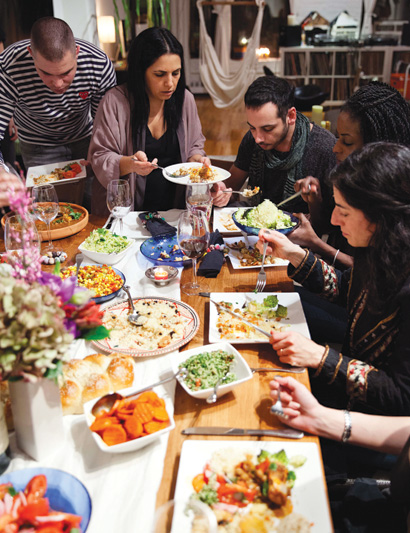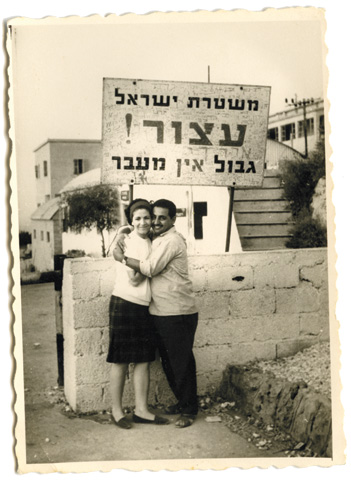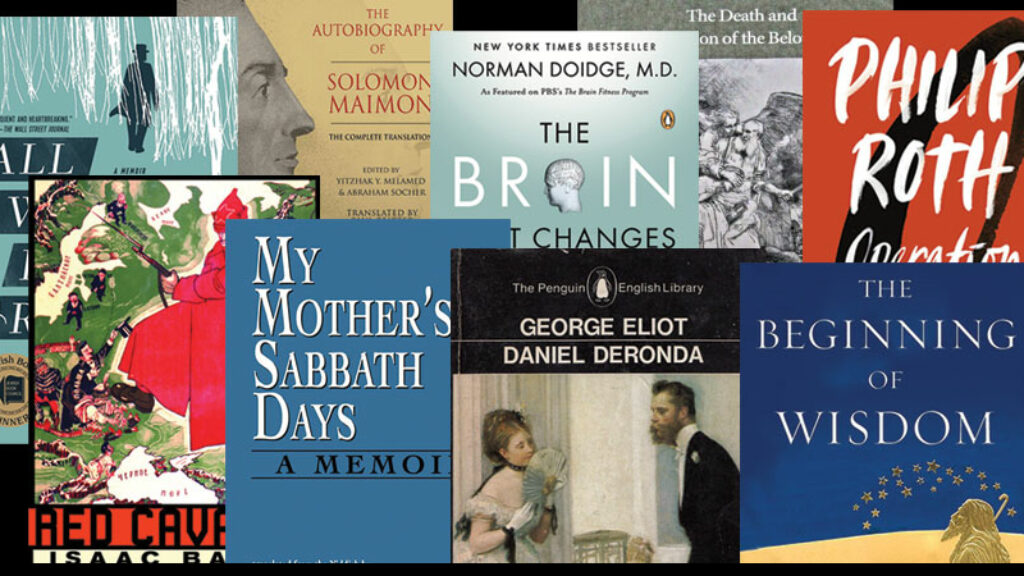Life with S’chug
Named after one of her two restaurants in downtown Manhattan, Einat Admony’s Balaboosta: Bold Mediterranean Recipes to Feed the People You Love weaves together an eclectic collection of recipes with personal vignettes of growing up in Israel and of life as a professional chef, mother, and wife in New York City. Admony, who is now opening a third restaurant in the West Village, also cooks for her kids, wakes up at night to concoct elaborate sandwiches for her husband, and cannot hold back from inviting friends over for dinner in her family’s Brooklyn loft several times a week. Apart from owning up to being unable to shed those extra 40 pounds, she seems capable of doing it all.

Having grown into a genre in its own right, the food memoir, complete with the prerequisite black-and-white photographs of elderly family members, poignant anecdotes, and nostalgic reminiscences, is only as entertaining as its protagonist. High-spirited, feisty, and down-to-earth, Admony is the kind of woman who comforts herself over heartbreak with a batch of sufganiyot, noting that “Revenge is always sweet, but all the more so when it’s filled with jelly.” Elsewhere in her narrative, she devises a “morning orgasm cocktail” to make up for the downsides of life with two small children. Her account of the sheer pleasure taken in cooking for, and eating with, her loved ones bursts with straightforward, no-nonsense enthusiasm for food and life.
Like Admony herself, the food she cooks is confident and exuberant—a combination of the quintessential Persian and Yemenite dishes she ate and helped her mother cook as a child in the religious town of Bnei Brak, on the outskirts of Tel Aviv—popular Israeli street foods and local Arab dishes—and the kind of recipes that appear on her restaurant menus—sophisticated, inventive combinations of Mediterranean, Middle Eastern, and North African flavors. In this sense, she is a prime representative of the group of Israeli-born chefs who have been stirring up a new wave of international interest in contemporary Israeli flavors. Casting herself as the latest incarnation of the Old World balaboosta, Admony is one of a group of culinary impresarios who may well be reinventing New York’s Jewish food by shifting local tastes from Ashkenazi-style comfort foods to the fresh, bold flavors that define Israeli cuisine.
Infusing the Yiddish-derived term for a perfect housewife with a contemporary spirit, Admony joins a long line of Jewish balaboostas who have been writing cookbooks in America since the late 19th century. She thereby continues a history of negotiating different visions of the ideal Jewish woman and the world she runs from her kitchen, while melding together culinary traditions and changing ideas about Jewish food in America. Nor is Admony the first balaboosta to pride herself on elevating the Jewish housewife’s penchant for feeding her family and guests to the highest professional level. As early as 1901, Hinde Amkhanitski, the author of the Yiddish Ler-buch vi azoy tsu kojhn un bakhn (Manual for How to Cook and Bake), assured her readers that “I have for many years in New York run restaurants that nourished the finest people with their capricious stomachs and all were satisfied with my food.” And is Admony’s preface to her recipe “One Big Steak for Two,” which begins “Men love sex. And steak,” really that different than the observation made by “Balabusta” (the pen name used by Adelaide Ettenson Lowe), editor of the 1949 edition of the Jewish Examiner Prize Kosher Recipe Book, that “I have never known a good cook who had marital trouble”? (I take the quotes from Barbara Kirshenblatt-Gimblett’s excellent essay “Kitchen Judaism” in Getting Comfortable in New York: The American Jewish Home, 1880–1950, a collection edited by Susan L. Braunstein and Jenna Weissman Joselit).
Yet in contrast to the cookbooks written by, or for, successive waves of immigrants from Central and Eastern Europe, and later by their American-born successors, Admony’s book is neither a search for the flavors of the past nor an immigrant’s story about the quest for belonging in a new homeland. Rather, it is about living, cooking, and eating in a shifting personal and cultural world in which memories of preparing dinner on an Israeli army base are just as inspiring as a dish consumed on a terrace in Provence. Enticingly assembled together on the same table, the logic that brings her dishes together is above all Admony herself—the chef as curator of a moveable feast that tells the story not so much of a particular cuisine, but of a personal, ever-evolving amalgam of family roots, travel impressions, friendships, and the influences they bring into one’s life.
Indeed, more than the recipes themselves, the most strikingly Israeli aspect of this book is the spirit of spontaneity, improvisation, and creativity it embodies. Israelis are not afraid of tinkering with their own culinary traditions, nor, for that matter, with anyone else’s. So why not take a traditional Sicilian pasta sauce featuring cauliflower, pine nuts, and dried currants, and reinvent it as cauliflower patties with a white wine vinaigrette? (I can only imagine how horrified the Sicilian balaboostas I know would be at such sacrilege.) And why not experiment with s’chug, the Yemenite condiment made with hot chilies and plenty of garlic and cilantro, which Admony’s father once carried with him to spice things up at a kosher Chinese restaurant, as the basis for a Thai curry?

Admony, however, takes this eclectic approach to cooking one step further and ends up presenting her readers with just about everything she likes to cook, from the homey meat and vegetable patties she makes her kids to creamy potatoes, lemon cheesecake, and Spanish-style shrimp invigorated by preserved lemons and cilantro. (Not all the recipes in Admony’s book are kosher.) The result is a hodgepodge of recipes that seems, at times, close to losing its coherence.
And yet, this somewhat incoherent character is also what makes Admony’s book so endearing—reflecting as it does the similarly disjointed nature of her readers’ lives as we simultaneously struggle to feed our kids meals nutritious enough to ward off scurvy, comfort ourselves after a long day of work, or muster up the energy for a romantic dinner. A voracious eater by her own admission, Admony describes life as what happens while we are busy cooking: separations, slow reconciliations, small moments of joy, the warmth and pleasure of sharing a home-cooked meal.
Her fervent belief that cooking well is the best revenge is infectious—so much so that, with two sick children under the age of five and several looming deadlines, I decided to channel my inner balaboosta and head for Tel Aviv’s Carmel Market. An hour later, I was back home with enough ingredients to cook my way through Admony’s book. Dodging the more elaborate, time-consuming recipes in the chapter titled “Fancy-Shmancy,” such as homemade spinach fettuccine with ricotta and walnut quenelles, as well as the slow-cooking dishes in the chapter “When Dinner Can Wait,” I was drawn to the bold, smoky flavors of the salads in the chapter on the outdoor barbecue. I tossed a couple of steaks on a stovetop grill and threw some bell peppers, jalapenos, purple onions, and tomatoes on the gas burners in order to make Admony’s spicy grilled salsa. I then chopped red onion and parsley to make a salad spiced with sweet paprika and cumin. As the afternoon wore on, I whisked together milk and heavy cream to make the custard known in Israel as malabi, sent it to the fridge to set overnight, and prepared the topping: orange marmalade stewed with brandy and sweet pistachios. By the time the kids were asleep, I had progressed to Admony’s roasted fish, ceremoniously laid out on a bed of Israeli couscous. It was a simple, delicate, wholly satisfying dish in which the tanginess of yogurt, the acidity of whole lemon slices, and the freshness of chopped dill mingled with hints of rosemary, garlic, and thyme.
In the morning, the malabi was still a liquid mess redolent of rosewater. (Admony’s instructions glossed over the crucial step of beating the mixture until it attained a pudding-like consistency.) Undeterred, I grabbed my son and headed back to the stove to bake a batch of Turkish coffee brownies spiked with a dose of cardamom. Over the next couple of days, driven by an unstoppable frenzy, I went on to make ceviche with raw beet, fennel, orange, jalapeno, and cilantro; sweet potatoes with honey and mustard seeds; and sunchoke soup with crispy chestnuts.
If Balaboosta’s success can be measured in terms of its power to get its readers into the kitchen, I will be the first to vouch for it. Sometime in the near future, I’ll be back in the market buying the ingredients for fenugreek fried bread.
Suggested Reading

A Decade of Recommendations
In celebration of our 10th anniversary, we asked 10 of our favorite readers which books they had found themselves recommending the most over the last decade.

The Mighty Jacobson
For an American Jew to read the magnificently funny and serious Howard Jacobson is to understand just how different the situation of English Jews is from their own.
Emancipation and Its Discontents
How a small, marginal community of Moravian Jews grappled with the challenges modernization and secularization brought to European Jewry.

The Beginning of Politics
Leon Kass hadn't really read the Bible until he found himself teaching Genesis to freshmen at the University of Chicago. Three decades later, he published his widely acclaimed The Beginning of Wisdom: Reading Genesis. Now he’s published his commentary on Exodus.
Comments
You must log in to comment Log In